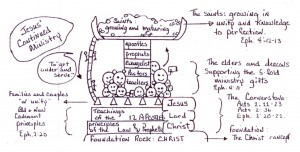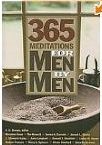6/3 What Structures do we find in Churches Today?
 As we continue to lay out the basic points of the church in our Christian Foundations blog, we next look at what we call ‘church’ today compared with what the early church looked like. We turn to church authority, some basic church leadership principles and a brief look at church government structures we find around us. Even in these topics, we must remember that Jesus is coming back for His Bride. Are you in that group of people?
As we continue to lay out the basic points of the church in our Christian Foundations blog, we next look at what we call ‘church’ today compared with what the early church looked like. We turn to church authority, some basic church leadership principles and a brief look at church government structures we find around us. Even in these topics, we must remember that Jesus is coming back for His Bride. Are you in that group of people?
J. CHURCH AUTHORITY
Another topic that is considered as Christian Foundations is that of Church authority. Several things need to be discussed here:
1. God has ordained Authority
All authority and power are ordained by God so that law and order be exercised and human society is preserved through appointed leaders, Romans 13:1-8. He delegates this authority to His appointed representatives through His anointing and the systems of government.
Although God is the author of authority, not all authorities use their power in Godly ways. Sometimes there is spiritual abuse that comes with control. The more any society’s authority structures break down, the more out and out anarchy happens. So it is in the Church also
2. The background authority to the Church is the Holy Spirit, Jesus and the Father.
|
The Father, the Architect, John 3:16, The Son, as the head of the church, has given Ascension Gift Ministries to the Church: Apostles, Prophets, Evangelists, Pastors and Teachers, Acts 5:32, Ephesians 4:8-16, 5:25. The Holy Spirit who gives us Spiritual Gifts’, 1 Corinthians 12:1-11: Gifts of Inspiration: Gifts of Action: Gifts of Revelation: Prophecy Faith Word of Wisdom Tongues Miracles Word of Knowledge Interpretation Healings Discerning of spirits |
K. THE PRINCIPLES OF CHURCH GOVERNMENT
1. The Commission of the Church
The church’s basic commission is similar to the commission Adam was given over the Garden: To Guide, Guard and Govern the worship to God, the ministry to the saints and to help bring in the lost. This was not to be a government of one man, nor a government of the people but under Christ’s headship, seeking His will and mind on all things.
God has a balance between love, truth and authority.
If any of these three elements are out of Godly balance, spiritual abuse is bound to happen.
2. Ultimate authority belongs to God.
 Father God has given Jesus all authority. Therefore, all authority is derived from Christ and exercised in His name and Spirit. The questions of anointing, calling and gifting are meant be under His authority.
Father God has given Jesus all authority. Therefore, all authority is derived from Christ and exercised in His name and Spirit. The questions of anointing, calling and gifting are meant be under His authority.
The only rightful power within Creation is the Creator’s. Such authority as men have is delegated to them by God. One day, they will answer to Him for the way they use this authority. In recognizing that all authority is God’s, submission to authority in all realms of life is a religious principle, part of God’s service requirement.
Besides the authority within the delegated church or ‘apostolic’ structure, two other areas of authority (Greek ‘exousia’) exist: Within marriage and family and to civil governments, Romans 13:1-6, 1 Peter 2:13, Matthew 22:17-21, Acts 4:19, 29. Satanic power is usurped from God and is hostile to Him, yet Satan only holds his power with God’s permission; Satan is being used as God’s tool for His purposes.
3. Church Government is meant to be collaborating, working together for the good of the body rather than in a hierarchical structure of power over those ‘lower down on the ladder’, Mathew 18 19, 23 8, Acts 15 28.
Christ’s humility provides the pattern for all Christian service, Matthew 20:26-28
“….the rulers of the gentiles lord it over them and their high officials exercise authority over them. Not so with you. Instead, whoever wants to become great among you must be your servants….and whoever wants to be first must you your slave – just as the Son of Man did not come to be served but to serve and to give His life as a ransom for many.”
The pattern for Christian government and official position is meant to come out of observable service. To have authority, you need to be ‘under’ authority. If you are faithful in small things, you can be given more.
4. However, Church Government has changed since the early church
The following is a quick comparison of the early church style of government compared to the organised, religious system of ‘church’.
|
EARLY CHURCH We are to have a board of elders or pastors along with one anointed, set leader. Aided by prophets and teachers, ruling local groups, with deacons to help administer the practical work. Spiritually gifted people in key offices. Apostles setting up new church groups. Focused in the Word, directed by the Holy Spirit. |
MAN’S DOCTRINE A one-man Pastoral or monarchist system, with oversight through a ‘global’ elite few. No input from local eldership, flattering office titles, not reliant on the Holy Spirit’s gifts or recognizing an individual’s anointing or calling. Filled with power struggles and strife. Hiring and firing by the ‘bylaws of man’. |
…or here is another way of looking at some common styles of church authority structures we find around us today:
What do you notice about this structure? Where is Jesus, the Builder of the Church? …and the believers, the saints who are meant to be growing? Where are the men and where are the women? Then who is benefiting from this style of a ‘one man ministry’ structure?
In comparison, the church that is the Lord’s bride will function this way…some day:
(Wow, this took so long to do I hope you understand what I was saying!)
6. We must remember that Jesus is the Head of His Church.
In looking around us at the conditions of some of ‘the church’, we tend to forget that it is intimately Jesus’ responsibility to build and perfect His Bride. Whether we see it or not, Jesus is intimately involved with the governing of His true Bride, Ephesians 1:22, Isaiah 9:6-9, 22:20-24. Remember also that not everyone who sits in the church building is part of His Bride. Previously, we wrote a post on the 6 stages of growth, where being the Bride is the highest level of maturity and growth.
7. Positions were set out to help bring the church to maturity.
Jesus gave the ‘fivefold ministry gifts’ (or ascension gifts) to the church, Ephesians 4:12, 13-16. These people are to be involved in helping to ‘perfect’ or bring to maturity of the saints and leading them into their own ministry.
Paul ordained and commissioned such elders in the Asian churches. Another early church leader, Titus was encouraged to do the same for Crete, Titus 1:5. Christian elder duties involves pastoral duties, James 5:14, 1 Peter 5:1-3 along with preaching, 1 Timothy 5:17. Teaching and ruling are closely associated functions for the elders as well, 1 Thessalonians 5:12. Administrative assistants, or deacons as they are called in some churches, are required to help the preachers of the word, Acts 6:2-3.
Selection of such elders and deacons was based on “doing the work of ….” before official appointments were made. Thaisis one reason why church leaders need to constantly on the look-out for people ‘…doing the work of…’ or showing the capabilities of helping before they are appointed into any position.
8. Other duties of the early church leaders:
Discipline is also part of Church authority. However, the aim of any ‘excommunication offenders’ is always with their offender’s restoration in mind, 1 Timothy 5:19-21. Paul had to deal with church splits and divisions because church discipline is not carried out the way that the Lord Jesus set out in Matthew 18:15-17 and 18:22 – forgive or confront.
9. Not everyone ‘in the church’ is part of ‘the church’
It also helps to remember that not everyone who sits ‘in a church’ is part of the Lord’s church. Those who do not know Jesus’ love and Lordship will be (sadly) counted as ‘…..Depart from Me, I never knew you…….” This is perhaps one of the scarcest verses in the Bible!
Past treatment by authorities, especially parents, often trigger reactions to those in authority. God deals with our heart issues toward authority.
L. PRODUCING FRUIT IN THE CHURCH
 Everyone produces some sort of fruit – some good and some not so good. What kind of fruit we produce is up to us; it is our choice! Because we have ‘changed sides’, we can allow the refining fires of sanctification to bring inward change to produce outward Godly fruit.
Everyone produces some sort of fruit – some good and some not so good. What kind of fruit we produce is up to us; it is our choice! Because we have ‘changed sides’, we can allow the refining fires of sanctification to bring inward change to produce outward Godly fruit.
Good fruit is not produced by striving, by self-effort for good works (1 Corinthians 3:11-15) or by pressure to do things for Him. The act of growing good fruit is to be natural and lead by obedience to the Holy Spirit.
Good fruit is produced in us as we ‘participate’ in His divine nature just as naturally as grapes are produced from being in union with the vine. It is part of the Holy Spirit’s job to help us grow good fruit. Our job is to be ‘in the vine’, ‘in the light’, so that His good work can shine through us, John 15:2-5,16, Eph. 5:9. This is the ‘fruit’ of our walk with Jesus, Philippians 1:11, 4:17.
M. IN CONCLUSION
 The church has always been part of God’s plan for Humanity. The creation of the Church is not ‘a second choice’ because of the hardness of the Jewish heart towards Jesus. In fact, the church is one of the mysteries of God, hidden in His plan since the foundations of the world, Ephesians 3:1-9, Deuteronomy 29:29.
The church has always been part of God’s plan for Humanity. The creation of the Church is not ‘a second choice’ because of the hardness of the Jewish heart towards Jesus. In fact, the church is one of the mysteries of God, hidden in His plan since the foundations of the world, Ephesians 3:1-9, Deuteronomy 29:29.
I trust this has helped in your understanding of what the Lord Jesus meant for His bride, His body, the Church to be and do. Many people have questioned the difference between what ‘the church’ of today is doing in comparison to the example left to us by the early church.
Others have walked away from the ‘organised, religious system’ called ‘the church’ in frustration and hurt. In fact we have a Guest Post coming where the comment was made: “Jesus I love…but the church not so much….”
Having been through 5 different church situations, with 5 or more different church hurts involved, I can truly speak about this situation. It is to this group of people that I would say “Jesus died for the group of people He called the church. Please don’t toss out the baby with the bath water and walk away from His beloved people.”
N. SOURCES USED IN THIS SERIES ON THE CHURCH
(NB All Bible References are from the New International Version.)
Arterburn, Stephen & Felton, Jack. Faith that Hurts , Faith that Heals, Nashville, Tenn. USA, 1991.
Chant, Barry. Firm in the Faith, Book 1, House of Tabor, S. Australia, 1986.
Conner, Kevin J. The Foundations of the Christian Faith, Acacia Press, Victoria, Australia, 1980.
Douglas, J.D. (Organizing Editor). The New Bible Dictionary, Inter-varsity press, England, 1962.
Elwell, Walter A. Topical Analysis of the Bible, Baker Book House, Michigan, USA, 1991. Author unknown.
Now that You’ve Received Christ, Full Gospel Business Men’s Fellowship International, Melbourne, Australia, 1976.
House, H. Wayne. Charts of Christian Theology and Doctrine, Zondervan Publishing, Michigan, USA, 1992.
Meyer, Allan. Search for Significance, Careforce Recovery Ministries, at St. Matthews Anglican Church Support Group, 1994.
Oxley, Hal. Lecture Notes from Life Ministry Bible College, Melbourne, Australia, 1970.
Oxley, Hal. Discipleship 1988, Life Ministry Bible College, Melbourne, Australia, 1988.
Paine, Leanne. Restoring the Christian Soul, Crossways Books, Illinois, USA, 1991.
Smith, Ray. “People Caring for People”, Acorn Press, Canberra, Australia, 1960.
Subritzky, Pat. “Spiritual Growth – Part One”, Dove Ministries, New Zealand, Manual: Ministering in the Power of the Holy Spirit, Dove Ministries, Auckland, NZ, 1989.
*******
In our next post, we shall continue with the theme of what Christians do as they follow Jesus. Finding our place in the Body of Christ is also essential as we lay out Christian Foundations. So join us in our next post as we look at Spiritual Gifts and our part in the spiritual growth of the Church.
Susanne Fengler, Blog Author
www.christianfoundations.jesus-treeoflife.info
Tags: Church structures
Filed under: Foundations of our Faith






Leave a Reply